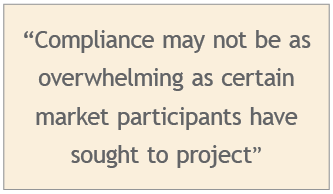 By James Gaden and Alice Molan, Walkers
By James Gaden and Alice Molan, Walkers
While some of the reactions to the Cayman Islands’ introduction of The International Tax Co-operation (Economic Substance) Law, 2018 (Substance Law) have been less than positive, the reality is that the Substance Law is a set of rules that fairly elegantly address OECD requirements for geographically mobile activities to have economic substance. Similar legislation is being enacted in all OECD-compliant jurisdictions with no or nominal tax, including Bermuda, the British Virgin Islands, Guernsey and Jersey. The intention of the Substance Law is that if a “relevant” entity is engaged in one of nine geographically mobile activities which the OECD identified as part of the Base Erosion and Profit Shifting report, then unless it is tax resident in another jurisdiction it will either: (a) have to comply with the Substance Law; or (b) cease that activity.
However, suggestions that the Substance Law means that all offshore operations need to be redomiciled to an onshore jurisdiction (where they will likely be subject to other compliance regimes, as well as audits) is, in the vast majority of cases, an overreaction, or simply incorrect.
In summary, the Substance Law states that if a “relevant entity” (a Cayman company, LLC or limited liability partnership) is carrying on one or more of nine listed “relevant activities”, it has to maintain “adequate” economic substance in Cayman, which will require it to determine adequacy having regard to the type and scale of relevant activity and the extent (if any) that relevant income is generated.
Firstly, in many cases a Cayman entity is not a relevant entity. Investment funds (as broadly defined within the Substance Law) are out of scope. Exempted limited partnerships (the gold standard vehicle for PE funds) are out of scope. Trusts are out of scope. Entities that are tax resident in another jurisdiction are also not in scope.
Secondly, even if an entity is a relevant entity, it will only be required to maintain economic substance if it is conducting a relevant activity. It’s only if a Cayman relevant entity is being used to undertake the business of IP holding, providing credit facilities, insurance, banking, shipping, providing distribution and service centre operations, providing headquarters related services, discretionary fund management or holding company business that it will need to consider the Substance Law and how it can demonstrate adequate substance.
But even if an entity is a relevant entity which is conducting relevant activity, it does not need to cease carrying on business in Cayman, or redomicile to comply. Outsourcing solutions are already being developed, and there is a wealth of legal, compliance and corporate services expertise in the Cayman Islands that can be tapped to assist to provide practical solutions to ensure compliance.

In relation to entities carrying on holding company business (as defined), the guidance indicates that reduced substance requirements apply, which may be met via the entity’s Cayman registered office and compliance with existing mandatory filing requirements.
At this stage, as the Substance Law is a Cayman Islands regulatory issue, the first step to compliance should be to engage with your Cayman Islands counsel to assess if entities in your group are in scope. Counsel should then be tasked with developing a compliance solution for the particular facts and circumstances with input, if required, from onshore regulatory and tax specialists. Engaging with onshore advisers will be important, particularly in regulated sectors such as fund management, insurance, and banking, because there may be onshore rules which come into play, or which affect implementation of your compliance plan.
Redomiciliation is unlikely to be necessary or useful. Firstly, the Substance Law does not present an opportunity for jurisdictional arbitrage: in order to stay off the EU “blacklist” on non-cooperative jurisdictions, many countries have, or will, introduce rules similar to the Substance Law.
Secondly, compliance may not be as overwhelming as certain market participants have sought to project: satisfying some degree of economic substance has been a feature of the global regulatory framework for some time. The fact that it is being introduced in the Cayman Islands now is simply an indication of that jurisdiction once again demonstrating a willingness to implement global best practice, with laws that are consistent with the requirements of industry.
At least in the investment funds community, the Cayman Islands continues to be the jurisdiction of choice for managers and investors alike. This is not simply because it is a tax-neutral jurisdiction. It is because its regulators and legal system continue to require that market participants comply with high standards of governance, while providing an environment that is cognisant of the requirements of commerce.
Cayman was one of the first jurisdictions to enter into an Intergovernmental Agreement with the US to implement FATCA, was an early adopter of CRS, was nimble in implementing a sensible beneficial ownership register regime, and regularly updates its anti-money laundering rules to reflect international best practice. It has a robust legal system with highly competent regulators. This is why the investment community continues to have strong faith in Cayman as a jurisdiction. The implementation of the Substance Law continues this tradition.
![]()
E: james.gaden@walkersglobal.com
E: alice.molan@walkersglobal.com
T: (852) 2596 3433, (852) 2596 3425

















